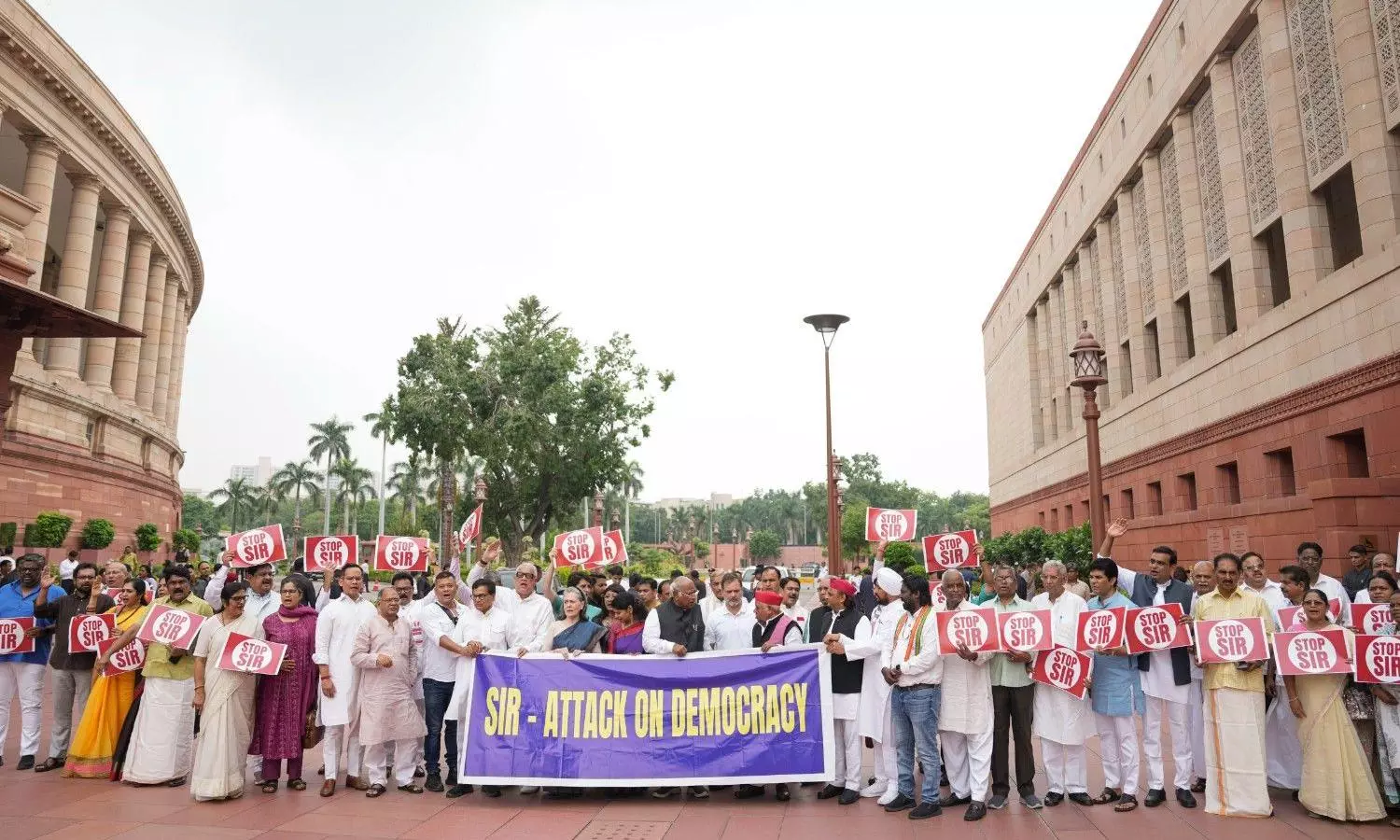
INDIA bloc parliamentarians stage a protest against the Special Intensive Revision (SIR) of electoral rolls in Bihar, during the Monsoon session of Parliament, in New Delhi, Monday, July 28. PTI
SC not stopping SIR rollout; what's in store for Bihar, rest of India? | Capital Beat
Despite widespread protests, the Supreme Court has refused to halt the Election Commission's Special Intensive Revision (SIR) in Bihar

A Capital Beat panel featuring senior advocate Sanjay Hegde, ADR founder Jagdeep Chhokar, and election data scientist Dr. Pyare Lal Garg discussed the Supreme Court's handling of the Special Intensive Revision (SIR) of Bihar's electoral rolls. The discussion followed the court's decision not to halt the publication of the draft voter list scheduled for August 1.
A Supreme Court Bench, comprising Justice Suryakant and Justice Joymalya Bagchi, deferred detailed arguments due to Justice Saurabh Banerjee's administrative commitments. Petitioners were asked to submit estimated time requirements for arguments, with no firm confirmation of a hearing on July 30.
Also read: CEC Gyanesh Kumar defends Bihar SIR; says dead, migrated can't be on voter list
Senior advocate Gopal Sankaranarayanan, appearing for the Association for Democratic Reforms (ADR), requested that the court stop the draft publication, citing the inconvenience to approximately 4.5 crore voters who might need to file objections after publication. The Bench noted the draft nature of the list and indicated the court could strike down the process later if found unlawful.
Court's position on draft voter list
Justice Suryakant declined to make the SIR process explicitly subject to the outcome of the pending petitions, stating that such an observation was unnecessary. The Election Commission's (EC) counsel Rakesh Dwivedi maintained that the draft list was not final and that the standard objection and correction process would be available.
The Bench made verbal observations, advising the EC to adopt an inclusive approach. It also verbally recommended considering documents such as Aadhaar and EPIC (Electoral Photo Identity Card) for inclusion in the voter list. However, the EC's affidavit had previously stated reasons against accepting Aadhaar, EPIC, and ration cards as valid proof.
Also read: Bihar SIR: Public hearing exposes citizens’ hardships; panel criticises EC
Chhokar pointed out that the names of voters who were on the rolls between January 2003 and June 2025 had been removed without following due legal procedures. He asserted that this action itself constituted an illegality.
Petitioners question court's urgency
The ADR argued that the urgency of the matter had not been adequately recognised by the court. It expressed concern that the 28-day delay since the petition was filed on July 4 had left the petitioners with little recourse before the draft list's release.
The court had earlier suggested that the EC delink the SIR from the upcoming Bihar Assembly elections. Justice J B Pardiwala had made this suggestion on July 10, proposing that the Assembly elections proceed with the January 2025 electoral roll while allowing the SIR to continue independently.
"This is something which is both urgent and important. The Supreme Court should have taken it up much earlier," Chhokar said.
Concerns over judicial restraint
The Bench chose not to issue binding directions to the EC, opting instead for repeated suggestions. Panellists questioned this restraint, especially after what they perceived as non-compliance with earlier court recommendations.
Dr. Garg remarked that Section 23 of the Representation of the People Act, 1950, required proper legal procedure for any removal from the voter rolls. He emphasised that the Supreme Court had a constitutional obligation to ensure implementation of the law and that continued delay undermined democratic safeguards.
He also raised concern over the implications of the removal of approximately 65 lakh names and the emergence of a new category called "untraceable voters", which was not part of the original framework.
Potential impact on Bihar elections
The panel warned that if the Supreme Court did not act before August 1, the publication of the draft list could render the case infructuous. With the EC having already issued instructions to replicate the SIR model in other states, the Bihar case was viewed as a national precedent.
Chhokar stated that the process was proceeding with unnecessary haste, risking critical errors. He called for slowing down the SIR and proceeding with the Bihar elections using the January 2025 rolls.
"At this speed, we may make mistakes which are very serious, which may have grave outcomes in the future," he warned.
Call for delinking SIR from elections
Dr. Garg argued that the existing legal framework allowed elections to proceed using older electoral rolls if a fresh revision was not feasible. He suggested that decoupling the SIR from the Bihar elections would allow the court adequate time to fully adjudicate the matter.
He asserted that the process underway was not a "Special Intensive Revision" but rather a "Special Intensive Removal", given the scale and method of exclusions observed so far.
The panellists agreed that if the hearing did not take place on July 30, the window for meaningful judicial intervention would close, raising concerns about the integrity of upcoming elections.
(The content above has been transcribed from video using a fine-tuned AI model. To ensure accuracy, quality, and editorial integrity, we employ a Human-In-The-Loop (HITL) process. While AI assists in creating the initial draft, our experienced editorial team carefully reviews, edits, and refines the content before publication. At The Federal, we combine the efficiency of AI with the expertise of human editors to deliver reliable and insightful journalism.)

